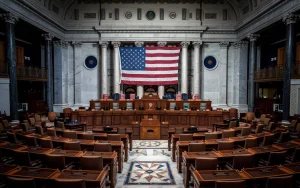Proposed legislation called the NO FAKES Act was introduced in the US House of Representatives on Thursday (September 12) due to concerns over AI-generated deepfakes.
Members from both political parties back the act, with it being introduced by a bipartisan group of representatives including Reps. María Elvira Salazar, Madeleine Dean, Nathaniel Moran , Adam Schiff, Rob Wittman, and Joe Morelle.
The acronym stands for ‘Nurture Originals, Foster Art, and Keep Entertainment Safe’ and it aims to “protect the voice and likeness of all individuals from unauthorized, computer-generated recreations from generative artificial intelligence (AI) and other technologies.”
The bill was first proposed in October of 2023 and was then shared with the US Senate in July. If it is passed into law, the act will take effect from January 2, 2025.
In a press release, congresswoman Maria Elvira Salazar said: “AI abuse threatens the ability of Americans to express themselves publicly, both online and in person. While states like Florida are taking action, Congress needs to address this issue nationwide.
“The NO FAKES Act will strengthen federal protections for your individual right to your voice and likeness and protect our ability to express ourselves creatively for the world to see.”
‘Federal law must catch up’ says representative as AI deepfake bill is introduced
If the act goes through, it will be recognized that individuals have a federal intellectual property right to their own voice and likeness including an extension of that right for the families of individuals after they pass away.
The intention is for this to be a nationwide solution to the growing advancements in generative AI and technology.
Rep. Dean said: “As AI’s prevalence grows, federal law must catch up—we must support technological innovation while preserving the privacy, safety, and dignity of all Americans,
“By granting everyone a clear, federal right to control digital replicas of their voice and likeness, the NO FAKES Act will empower victims of deep fakes; safeguard human creativity and artistic expression; and defend against sexually explicit deepfakes.
“I’m grateful to work with Congresswoman Salazar and our colleagues on both sides of the aisle to move forward with commonsense, common ground regulations of this new frontier of AI.”
Featured Image: Via Ideogram
The post Bill to protect against AI deepfakes introduced in US House appeared first on ReadWrite.







